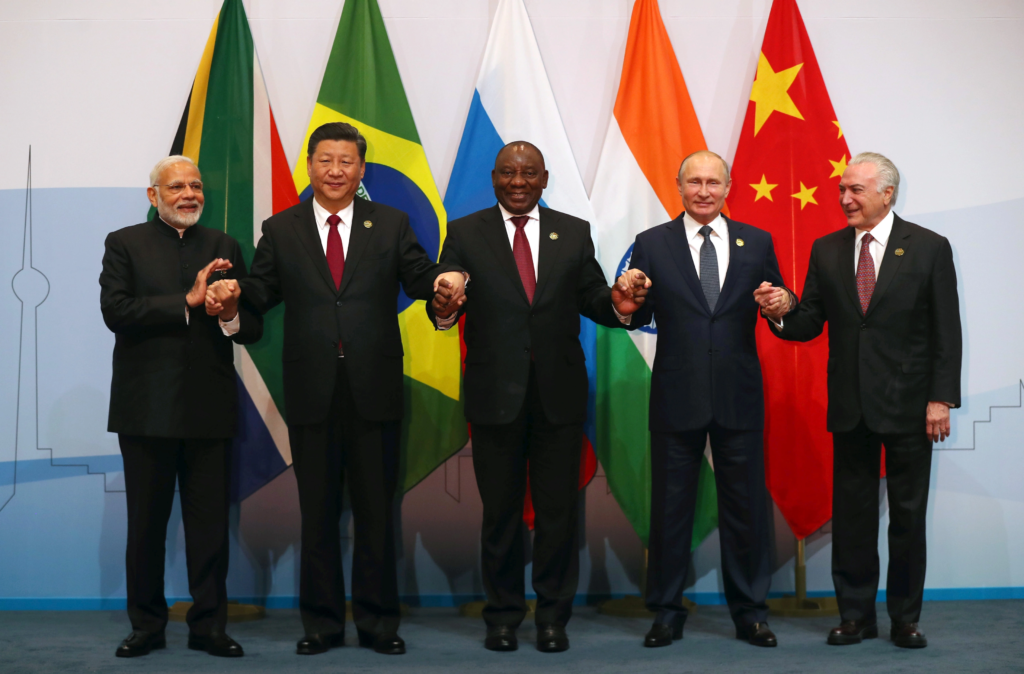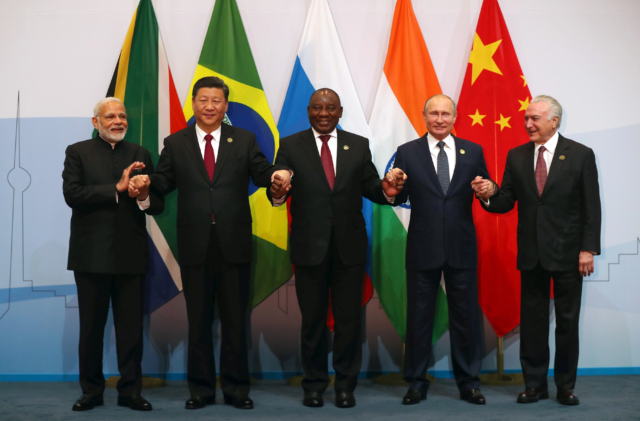
Chinese President Xi Jinping’s visit to South Africa for the Brics summit next week will be a stage for Beijing to promote its post-Covid charm offensive, including agenda items like membership expansion and de-dollarisation.
While the Johannesburg summit is not expected to yield any concrete results, it will be watched closely by developing countries looking to the Brics group – Brazil, Russia, India, China and South Africa – as a major counterweight to Western influence in global governance.
South African President Cyril Ramaphosa, as Brics chairman for 2023, will also host Brazilian President Luiz Inacio Lula da Silva and Indian Prime Minister Narendra Modi for the summit. Russia will be represented by Foreign Minister Sergey Lavrov, with President Vladimir Putin to participate virtually.
Do you have questions about the biggest topics and trends from around the world? Get the answers with SCMP Knowledge, our new platform of curated content with explainers, FAQs, analyses and infographics brought to you by our award-winning team.
In addition, Xi and Ramaphosa will hold talks to strengthen ties and will witness the signing of various agreements, according to the South African president’s office.
On August 10, ahead of Xi’s visit, Chinese companies signed 20 deals to buy products worth US$2.2 billion from South Africa. South African Trade Minister Ebrahim Patel and Chinese Minister of Commerce Wang Wentao witnessed the signing at a meeting of a joint economic and trade committee aimed at boosting South African manufacturing exports to China. Anglo American Platinum, Glencore, Sappi and Pioneer Fishing were among South African companies involved in the agreements.
Xi will also co-chair a China-Africa Leaders’ Dialogue on the sidelines of the summit, according to China’s foreign ministry – welcome news for African countries such as Algeria, Egypt, Ethiopia, Nigeria and Senegal, which are eager to move another step closer to joining the bloc.
Yun Sun, head of the Stimson Centre’s China programme in Washington, said China had been focused on its post-Covid diplomatic charm offensive for some time now, and developing countries and emerging markets were a big part of it.
“[The] Brics summit this year covers both. I am sure issues such as African debt sustainability, post-Covid economic recovery and the war in Ukraine, as well as the expanded membership of Brics, will be high on the agenda,” Sun said. “China needs to show that it is still firmly committed to the future of Africa, provide reassurance and offer assistance. Africa needs the commitment from China as well.”
Across Africa, Brics members are seen as important trade partners, sources of foreign investment and champions of the concerns of so-called developing countries, according to Tim Zajontz, a research fellow in the Centre for International and Comparative Politics at Stellenbosch University, South Africa.

“We can expect President Xi to stress at the summit that China and the Brics are at the centre of South-South cooperation and ready to boost economic development across Africa,” Zajontz said, referring to collaboration among countries in the Global South.
“It is little surprise that countries like Burundi, Egypt and Ethiopia want to join the grouping,” he said.
“While their immediate accession appears unlikely, the fact that President Ramaphosa has invited other African leaders to attend the Johannesburg summit shows that there is keen interest to increase the Brics’ footprint on the continent.”
Expansion of the bloc as well as trade in local currencies as an alternative to the US dollar are likely to be the two main topics discussed – even if they do not end up leading to any firm outcomes.
“China is among the supporters of Brics expansion among the five countries, but we are unsure if any country will be able to fully join Brics at this summit, as the criteria for new admissions has yet to be finalised,” said Steven Gruzd, head of the Africa-Russia Project at the South African Institute of International Affairs.
When the debate turns to currencies, it is likely the summit will push for reforms of the international economic governance system, including political discussion about the dominance of the US dollar and the euro in trade and financial transactions. But Carlos Lopes, a professor at the University of Cape Town’s Nelson Mandela School of Public Governance, said not to expect any major decision on this.
Neither is it expected – whether hoped or feared – that the Brics’ New Development Bank (NDB), led by former Brazilian president Dilma Rousseff, is ready to compete with Western-centred international financial institutions at this stage, according to Lopes.
Zajontz, who is also a lecturer in international relations at Dresden University of Technology, said the future of the NDB would be high up on the agenda at the summit as its lending had decreased lately and the bank had faced challenges to raise capital following sanctions against Russia.
“In the medium to long term, the NDB wants to further de-dollarise its capital base by increasing local currency lending and by increasing NDB membership,” he said. Egypt joined the NDB in 2021, and Algeria and Zimbabwe have expressed interest to join as well.
“But [it is] not just the question of possible new African NDB members but also whether the NDB might soften its current policy to only lend to member countries,” Zajontz said, adding the many African states “are keen to diversify their creditors in times of tight development finance”.
The Brics meeting comes as tension between the West and the East is growing. Many African political actors, including recent army putschists in Mali, Burkina Faso, Sudan and Niger, are trying to take advantage of this discord to either protect their acquired power or contest established authority, according to Lopes.
“The summit will be an opportunity for Brics, and countries invited, to demonstrate independence in relation to the West while reserving endorsement of their nemesis, Russia, and their competitor, China,” he said.
Cameron Hudson, a senior associate at the Centre for Strategic and International Studies’ Africa programme, said that as well as trying to diversify their external partnerships, African countries were looking to have a greater voice on the world stage.
He said African leaders would want to explore how Brics could be used as a forum where policies that benefited developing countries were created and coordinated.
“Africans are not interested in the illusion of coordination. They want to see real change and real impact in tangible ways that benefit them and their societies,” Hudson said.
This article originally appeared in the South China Morning Post (SCMP), the most authoritative voice reporting on China and Asia for more than a century. For more SCMP stories, please explore the SCMP app or visit the SCMP’s Facebook and Twitter pages. Copyright © 2023 South China Morning Post Publishers Ltd. All rights reserved.






